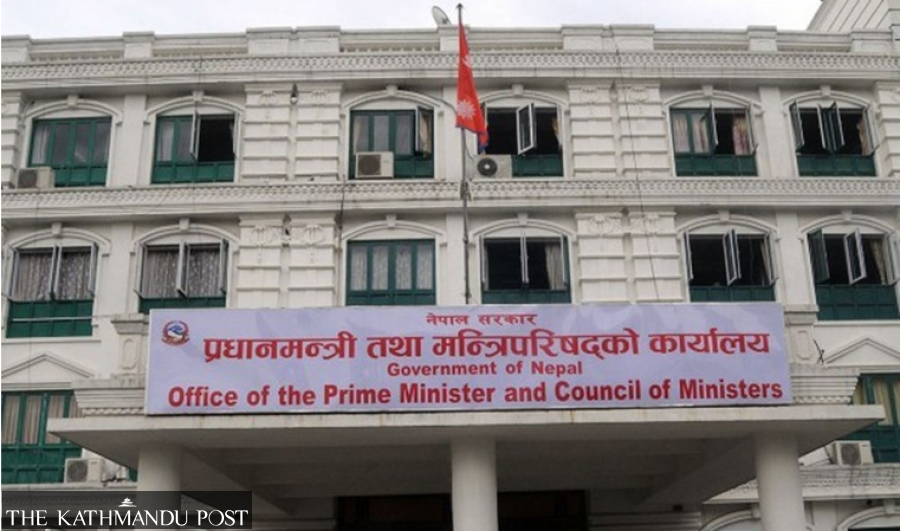National
Government approves guideline aimed at materialising ‘Make in Nepal’ campaign
The guideline mandates the use of Nepali products in all government offices as far as practicable. It also states uniform for public staff should be made of domestic products.
Post Report
Here comes a step towards materialising the government’s ‘Make in Nepal’ campaign.
The government has approved a new guideline that states that all individuals who receive their salary from the state coffers should use domestic products as much as possible.
The guideline states that government staff can use and purchase any Nepali product that is up to 15 percent more expensive than the foreign product in order to materialise the ‘Make in Nepal’ initiative.
The government on Friday approved the ‘guideline for using domestic products in public entities—2081 BS’ and made it mandatory for public staff to use national products as much as possible, according to Minister for Information and Communication Prithvi Subba Gurung. The proposal was tabled by the Ministry of Industry, Commerce and Supplies.
Public staff should use not only the made-in Nepal uniform but also other products in their respective offices as far as practicable, said Chief Secretary Ek Narayan Aryal.
“The initiative aims to promote the use of Nepali products among the general people,” Aryal said. “It will also help boost the production of various kinds of products inside the country and will take us towards becoming self-reliant.”
Some private sector entities have already started drives towards ‘Make in Nepal’ and ‘Make in Nepal—Swadeshi’ campaigns, among others, but no tangible progress has been made in the last couple of years.
When KP Sharma Oli was the prime minister in 2021, the ‘Make in Nepal-Swadeshi' campaign was introduced by the Confederation of Nepalese Industries (CNI) in association with government entities. The campaign had aimed to establish more than a thousand new industries and raise the industrial sector contribution to the gross domestic product to 26 percent by 2030 from the current level of less than 14 percent. The campaign also hoped to create a good number of dignified jobs within the country and targeted to expand the country's export to $5 billion annually in the next five years. The campaign, however, is not much heard these days.
The CNI recently held a follow-up event in Kathmandu where it informed that it had already enrolled 135 domestic industries under the ‘Swadehi Campaign’ and that those enlisted products are using a standardised logo featuring a rhinoceros on their products.
The erstwhile government led by Pushpa Kamal Dahal also listed the agenda of ‘Make in Nepal’ in its policy and programme. The policy and programme document stated the government would encourage the use of domestically produced food items, shoes, medicines, and cement, etc., and provide appropriate interest grants on taxes, electricity tariffs and loans to cooperatives and private sectors to encourage production.
It also stated that it would protect indigenous industries and products through customs regulation, job banks, start-up funds, and business development centres to promote the ‘Make in Nepal’ and ‘Made in Nepal’ campaigns.
Minister Gurung said that once the guideline is out, everything that is used in government offices—from dustbins to tables—should be domestic products. “The ministers should also wear attire made of domestic products,” he added.
But according to the Chief Secretary Aryal, the government has to amend the Public Procurement Act to implement the new decision. The Public Procurement Act states that all government offices should procure the uniforms, goods and services from the lowest bidder. But the new guideline states that government staff can use and purchase any Nepali product that is up to 15 percent more expensive than the foreign product, which means the government has to revisit and amend the Act.
“The Procurement Act does not allow us to procure goods and services apart from those with the lowest price,” said Aryal. “If any Nepali product is available in the market but up to 15 percent more expensive than the foreign one, we have to procure the Nepali product despite its higher price as compared to the foreign one. So we need to amend certain clauses of the Procurement Act.”
In the Cabinet meeting on Friday, the government also decided not to accept any kind of conditions while taking loans from foreign lenders. “If any lender is interested in providing loans to us, it should be based on our need and priority,” another minister said. “So we have to be cautious while taking the loans from now.”
Nepal’s prospect of getting grants by bilateral and multilateral donors will diminish after it graduates from least developed countries (LDCs), so it will be left with limited options after 2026. “But we are also equally concerned about the possible debt trap and want to make a strategy about taking loans and their conditions by identifying our needs and requirements,” the minister said.
While addressing media persons to make public the various Cabinet decisions, Minister Gurung, who is also the government spokesperson, said that the current government would last a full term and that no one could replace it.
“From the day this government was formed, a baseless rumour has been spreading—that it would not last its full three years’ term,” Gurung said. “Some jealous opponents are spreading these kinds of rumours against the government.”




 10.12°C Kathmandu
10.12°C Kathmandu














